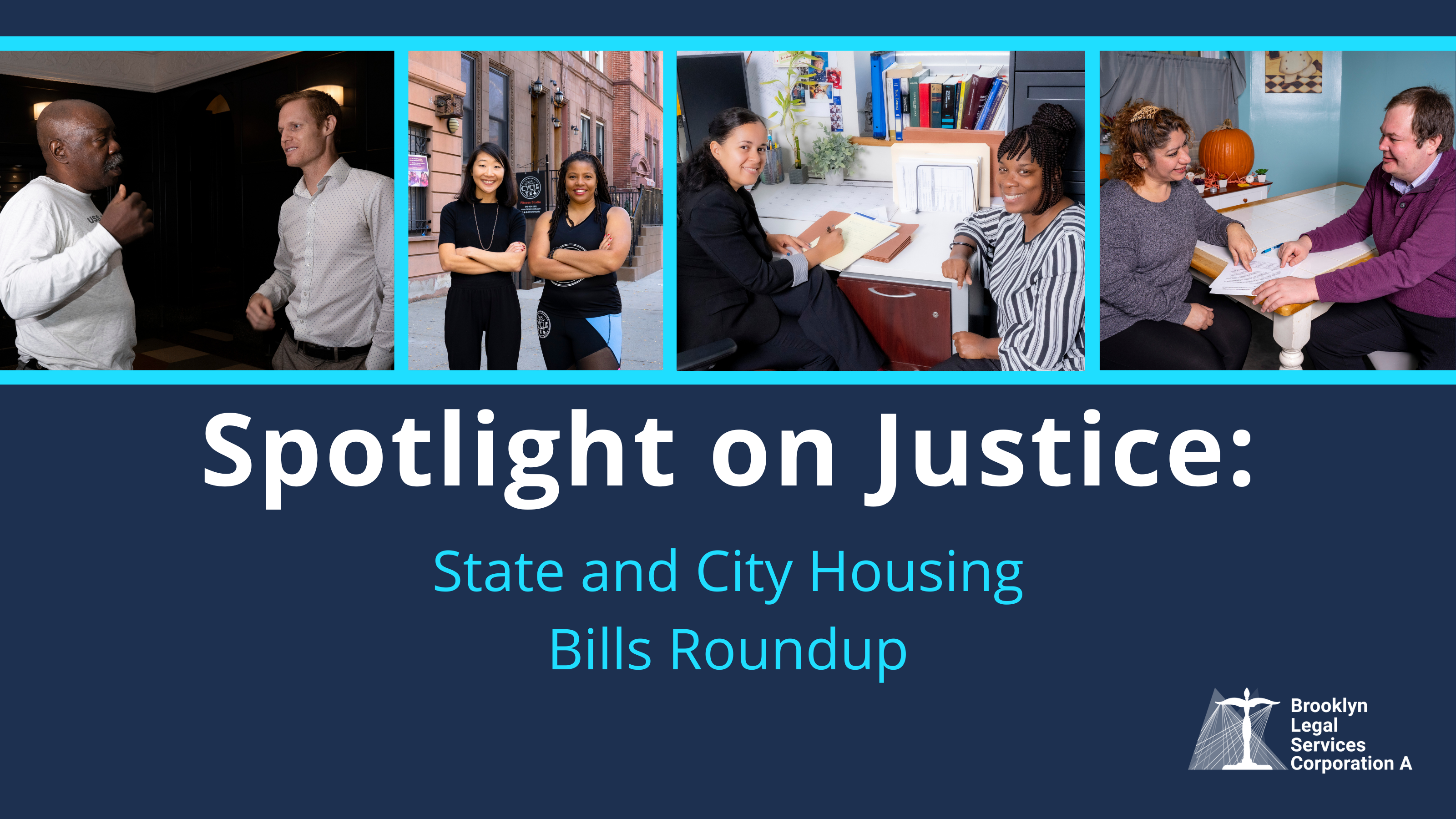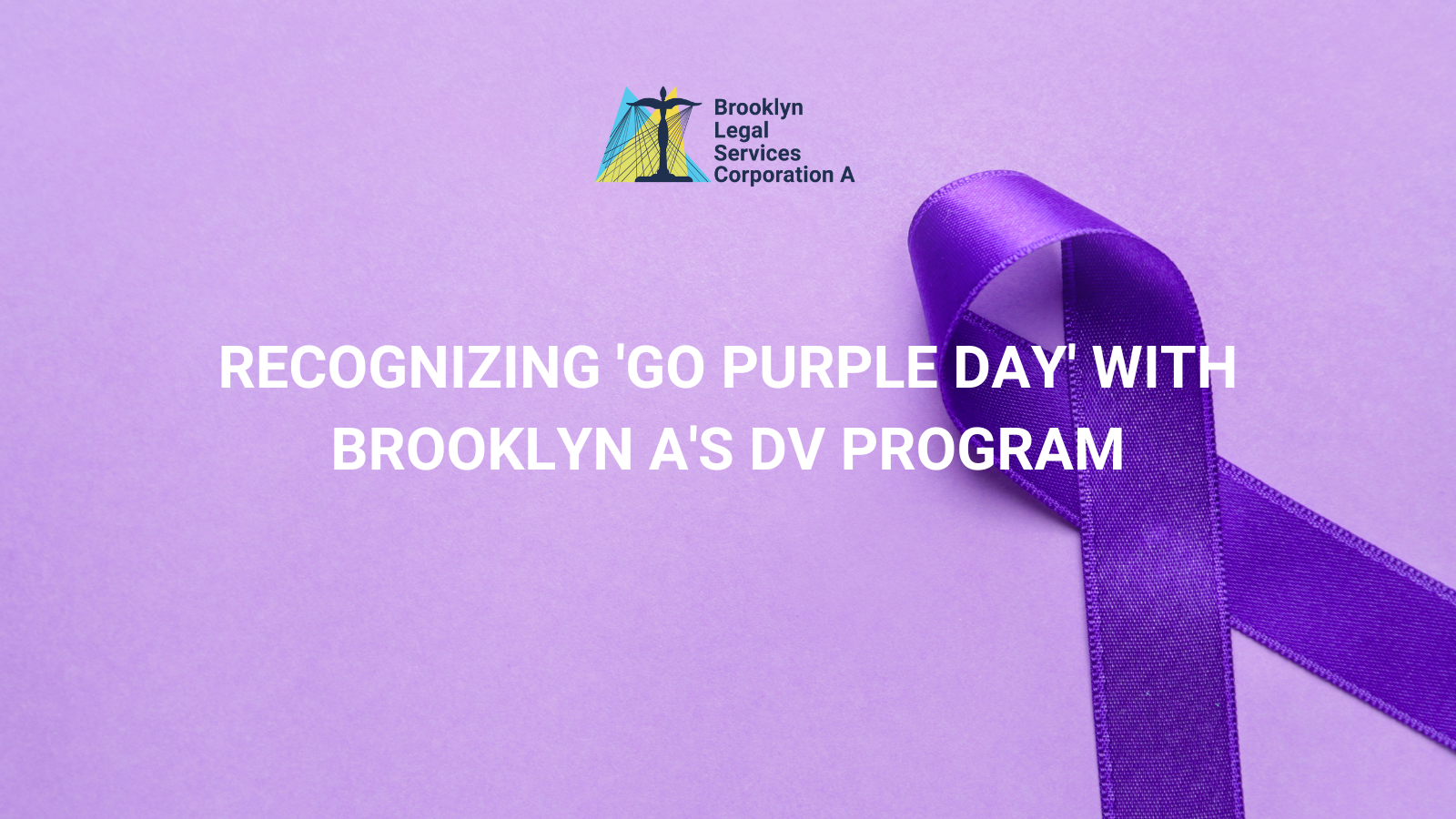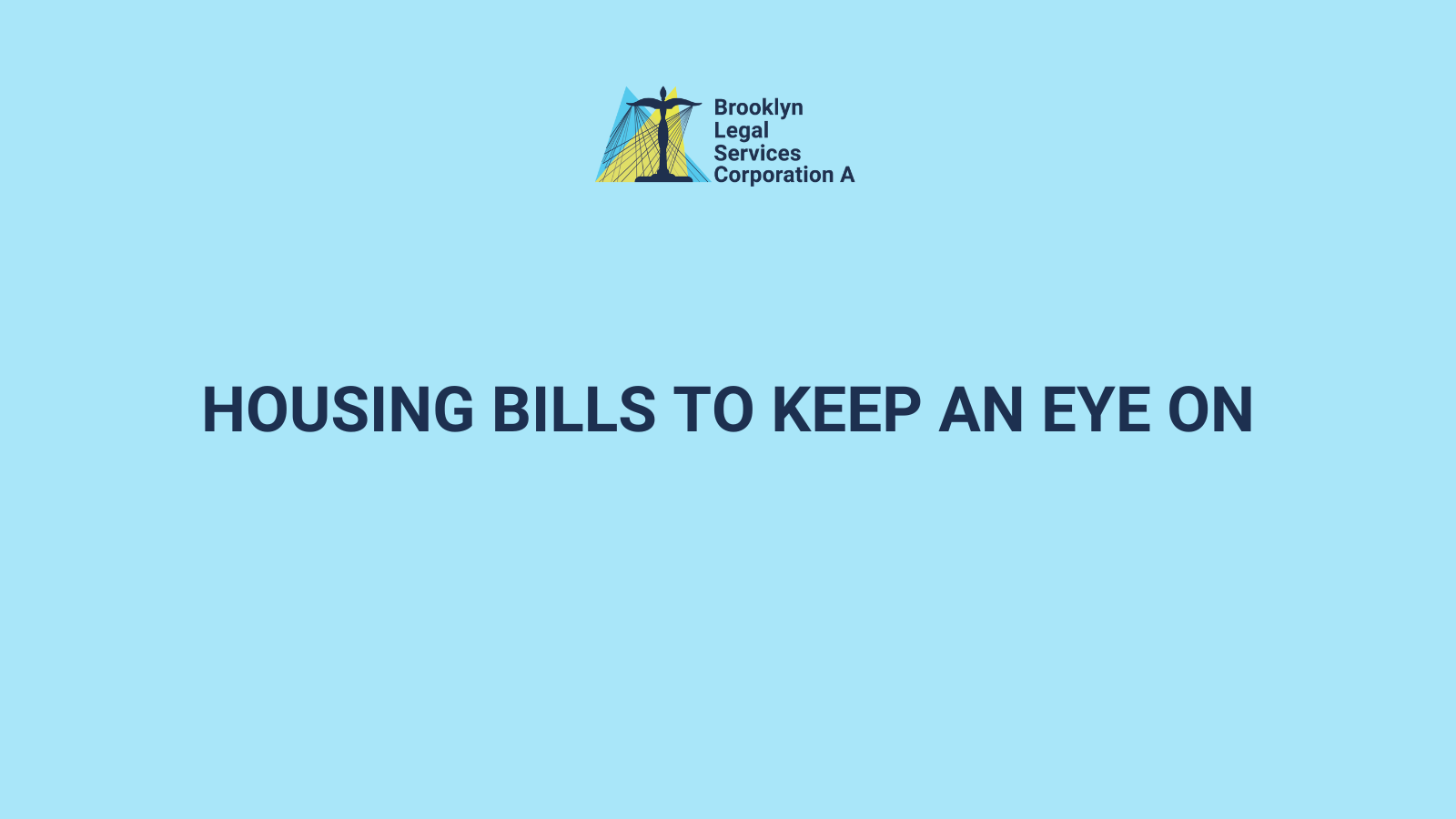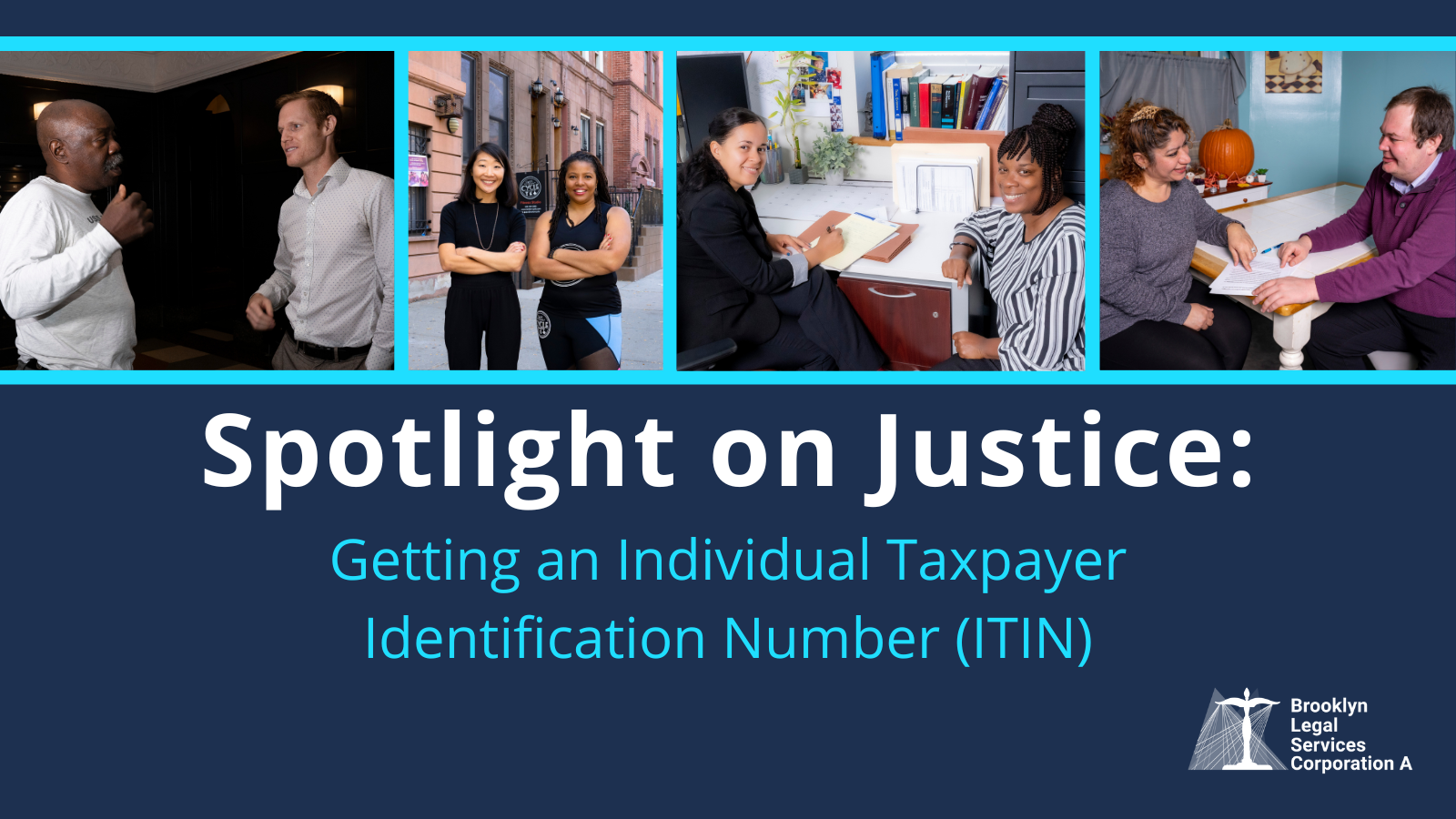By Daniela Adao October is an important month for Brooklyn A’s Domestic Violence Program: it…

State and City Housing Bills Roundup
By Ruki Asfe
New York’s housing crisis is on top of everyone’s mind. Prices have skyrocketed, reaching new all-time highs multiple times this year. The pressure on market-rate units has grown as would-be homebuyers deterred by high prices continue to hunt for rentals, and New York City’s Rent Guidelines Board voted to increase rent for rent-stabilized units. There are more than 170,000 active eviction cases across New York State, and here at Brooklyn A we continue to see our clients continuously struggle to locate alternative affordable housing when having to leave their homes.
Elected officials at the city and state level have made housing their top priority in the most recent legislative sessions and finalized budgets. Governor Kathy Hochul pushed for her broad housing plan which was hotly contested. While the state budget did include additional funding for emergency rental assistance, the Governor’s housing plan did not include many aspects of what affordable housing advocates had urged.
As lawmakers look ahead to the upcoming year’s session, Brooklyn A reviewed the measures that didn’t become law (or may still face legal challenges) from this past year that will no doubt continue to be debated by lawmakers and housing advocates.
Below is a brief round-up of some of the policies considered by the state and city legislature last session that we’ll be watching moving forward.
Flagship: The NY Housing Compact
Jurisdiction: City and State
Current Status: Discussion with lawmakers, no legislation in Assembly or Senate committees
Governor Hochul’s signature housing policies to address the crisis of housing shortages and increasing rent are ambitious and center on building new housing to meet the state’s needs. Some proposals within the NY Housing Compact included allowances for conversion of office buildings to residential units, legalizing city basement apartments, and restructuring zoning that slows down the development of new housing. Ultimately in this latest legislative session, the key pro-development elements of the Governor’s plan failed to pass. The Governor came under fire from Senators and Assembly members, particularly those representing suburban areas of New York City, due to concerns about the potential repercussions on zoning laws. Opponents of the plan expressed their dismay over its potential effects on local legislators and labeled it punitive, as it aimed to supersede non-compliant local jurisdictions by establishing a state board with the authority to overturn decisions against new development projects. Other critics felt that the Governor’s housing plan was not comprehensive enough, arguing that the new housing produced under it would not make a dent in the state’s housing crisis. Governor Hochul has stated that she remains committed to discussions with lawmakers.
In New York City, Mayor Adams’ FY24 budget includes $4 billion dollars for the construction of affordable housing. Part of this funding is earmarked for rental assistance vouchers, which the New York City Council have voted to expand eligibility for in a recent legislative package. Mayor Adams signed an order to eliminate the 90-day wait period for shelter residents applying for rental assistance, known as CityFHEPS. However, he also vetoed a larger package of bills that would have further expanded voucher access—the City Council overrode the Mayor’s veto, and it’s possible the Adams administration could sue to challenge the package again.
Good Cause Eviction (NYS Senate Bill S3082/Assembly Bill A5573)
Jurisdiction: State
Current Status: Discussion with lawmakers, Bills in Judiciary and Assembly Housing Committee
Initially introduced in 2019, this bill would prevent landlords from evicting tenants without a designated good cause (such as failure to pay rent or creating a nuisance). The bill also prevents landlords from enacting rent hikes greater than 3% without justification, which also force people out of their homes simply by making them unaffordable. The Community Service Center estimates the bill, as currently written, would apply to half of all renters in New York State. Activists and supporters of the bill state that the bill would make it fair for tenants and landlords, as it still allows landlords to raise rents to fund necessary building improvements, while giving tenants the dignity and peace of mind that they can remain in their home.
A handful of NY state municipalities enacted good cause by city ordinance, but state courts ultimately sided with landlords in recent months striking down nearly all the local laws, citing that the law restricted landlord rights. Currently, a statewide bill exists but sits awaiting review by the Judiciary and Assembly Housing Committee—a City Council resolution introduced by Council Member Sandy Nurse calls for the Governor to pass the bill, and many housing justice organizations in the state have joined that call.
Housing Access Voucher Program (NYS Senate Bill S2804B/ Assembly Bill A3701B)
Jurisdiction: State
Current Status: Bill in Finance Committee
The Housing Access Voucher Program (HAVP) is a proposed subsidy for low-income New Yorkers. It is meant to work in conjunction with CityFHEPS and FHEPS subsidies, which was implemented to be a temporary relief to eligible tenants. HAVP is modelled after Federal subsidies like Section 8. It would cap a tenant’s rental portions at 30 percent of their income, covering the remaining costs of rent, while also allowing other vulnerable New Yorkers (like undocumented individuals, no-income individuals, and individuals with felony convictions) to be eligible for rental assistance.
This bill has been introduced by State Senator Brian Kavanaugh multiple times but has not gained traction to pass through the Senate and the Assembly. Compared to good-cause eviction bills, HAVP receives less attention since good-cause bills have strong opponents among landlords and associations that support them. Implementation of this new voucher program would rely on budget allocations, which often turn into negotiations with significant concessions. HAVP has allies in the progressive caucuses, along with many tenant-activist networks, but the budget focus has remained on building new housing and repairs. The fate of the bill rests upon further support from lawmakers, the NYS Senate Majority Leader, the NYS Speaker of the Assembly.
Ending the “Frankensteining” loophole (NYS Senate Bill 2980C/Assembly Bill A6216)
Jurisdiction: State
Status: Passed by Senate and Assembly, but has not been signed into law
NYS Senate Bill S2980c (and the sister Assembly Bill A6216) aims to amend the NYC administrative code and the Emergency Tenant Protection Act of 1974 to establish certain standards for rent regulated apartments. Sponsored by State Senator Brian Kavanaugh, the bill seeks to amend rent regulation exemptions, prevent substantial rent increases, and prevent deregulation of apartments between tenancies. Supporters of this bill want to not only help prevent deregulations, but also establish parameters for combining two or more vacant apartments (“frankensteining”). This practice of combining apartments allows landlords to raise the rent, which not only makes apartments less affordable, but also changes the status of an apartment from rent-stabilized to unregulated, according to current state laws. The measure was passed by both chambers in Albany but now awaits the Governor’s signature.
Applying the Housing Stability and Tenant Protection Act of 2019 to rent calculations and rent records maintenance and destruction (NYS Senate Bill S2943B/Assembly Bill A4047B)
Jurisdiction: State
Status: Passed Senate and Assembly, but has not been signed into law
This bill would require landlords to maintain clearer and longer maintenance of records to support rent calculations, and would allow for a longer time period for review of rent history to determine overcharges. This legislation allows for more tenant protection, especially low-income tenants facing nonpayment cases. A rent regulated apartment’s rent history is a crucial resource for renters and Tenant Associations that believe their rent was raised higher than legally allowed.
Social Housing Policies/Community Opportunity to Purchase Act/Tenant Opportunity to Purchase Act (NYS Senate S221/ Assembly Bill A3353)
Jurisdiction: State (TOPA) and City (COPA)
Status: Laid over in Committee (TOPA), Laid over in Committee (COPA)
NYS Senate Bill S221 is meant to establish the “Tenant Opportunity to Purchase Act” which will maintain housing for low-income or vulnerable New Yorkers by allowing tenants of a building the right of first refusal to purchase a building or unit when the landlord/owner decides to sell the building. “Community Opportunity to Purchase Act” would do something very similar: instead of tenants, it would allow qualified entities the first opportunity to purchase buildings when they are on sale. Both bills serve the same purpose: they prevent displacement and homelessness for low-income individuals by enabling either existing residents or nonprofit organizations that serve the impacted community to purchase the building. Like the Housing Access Voucher Program, this bill hasn’t received consistent attention this year. The Legislature and City Council respectively are primarily focused on budgetary needs to create new housing or improve existing buildings.



